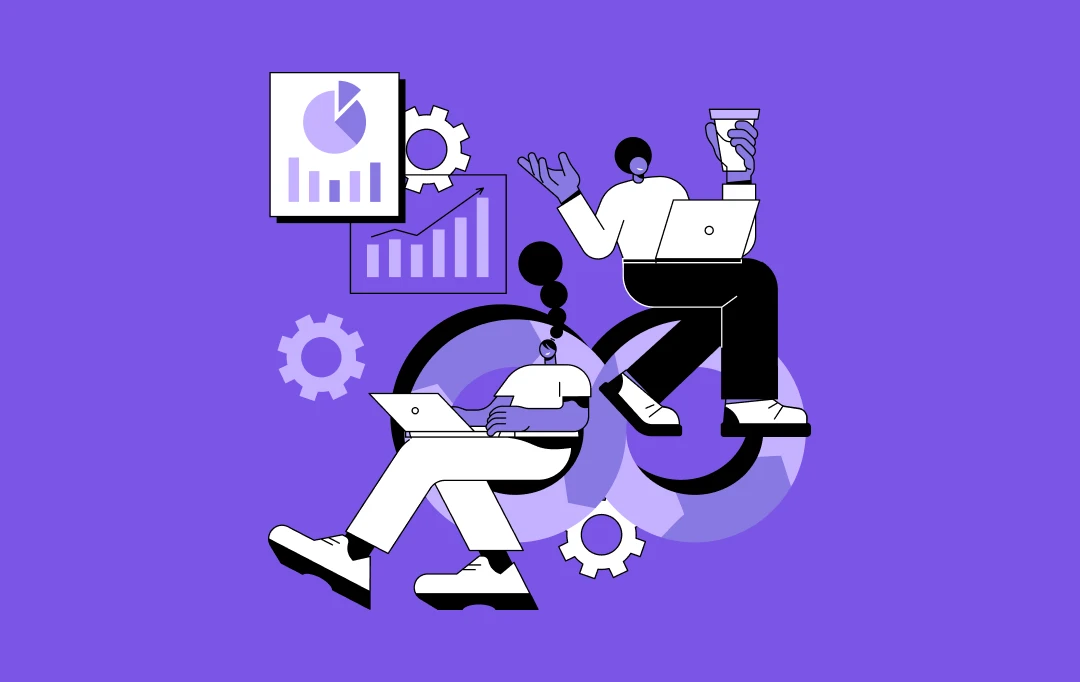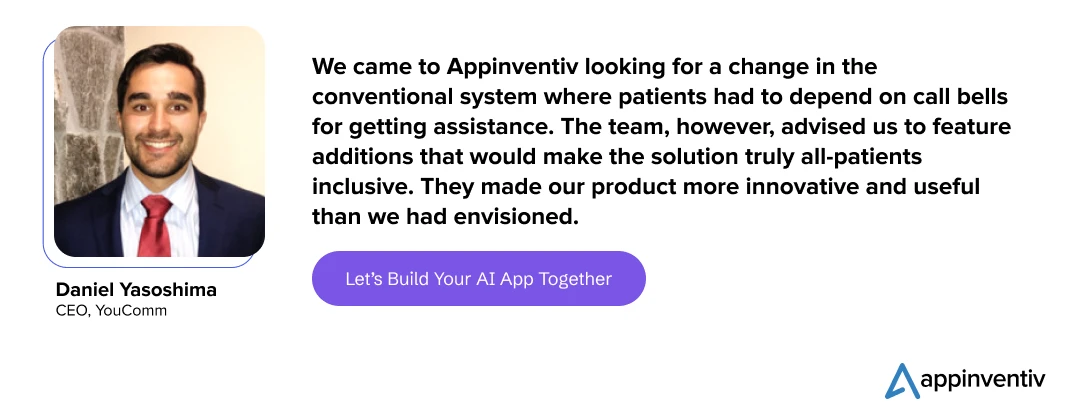- The Transformative Rise of Autonomous Agents in Business
- Practical Applications of Autonomous Agents in Business Across Industries
- Customer Service
- Sales and Marketing
- Supply Chain Management
- Finance and Accounting
- Research and Development
- Cybersecurity
- Human Resource
- Real Estate
- Manufacturing
- Gaming
- Travel and Hospitality
- Content Creation and Marketing
- Automotive
- Healthcare
- Autonomous Agents Implementation Process
- Define Objectives
- Conduct Technical Feasibility
- Design the Agent Architecture
- Choose the Right Tech Stack
- Develop and Train AI Agents
- Testing and Quality Assurance
- Deployment
- Monitor and Maintenance
- Evaluate and Iterate
- The Future of Implementing Autonomous Agents in AI
- Develop and Deploy Autonomous Agents in Business with Appinventiv
- FAQs
The modern business world is well-acquainted with the incredible outcomes that emerge when human ingenuity joins forces with autonomous agents who learn and evolve on their own. The concept of autonomous agents in business is not entirely new, as the development of generative AI models like ChatGPT has already brought these digital entities to the forefront of technological innovation. The excitement is well-founded.
While ChatGPT has demonstrated the profound impact generative AI can have on our daily lives, its capabilities are impeded by some limitations, such as maintaining context over long conversations, handling complex reasoning, and accessing real-time information.
Now, imagine a scenario where artificial intelligence agents not only generate high-quality content but also autonomously navigate complex tasks, learn from their actions, apply logical reasoning, execute operations, conduct transactions, and do a lot more. Though it sounds like the script of a sci-fi movie, it is the reality that autonomous agents promise to deliver.
Gartner predicts that by 2028, autonomous agents will initiate one-third of all interactions with generative AI platforms like ChatGPT and Gemini AI.
These self-adaptive digital agents are redefining the boundaries of innovation and efficiency in the corporate world. It is why businesses across industries are increasingly embracing autonomous agents in AI as a robust solution to drive unprecedented growth and success.
Grand View Research highlights the burgeoning market of autonomous agents in AI, which was valued at $3.93 billion in 2022 and is projected to grow at a CAGR of 42.8% from 2023 to 2030. This rapid growth reflects both technological advancements and the increasing appetite for autonomy within the business sector.
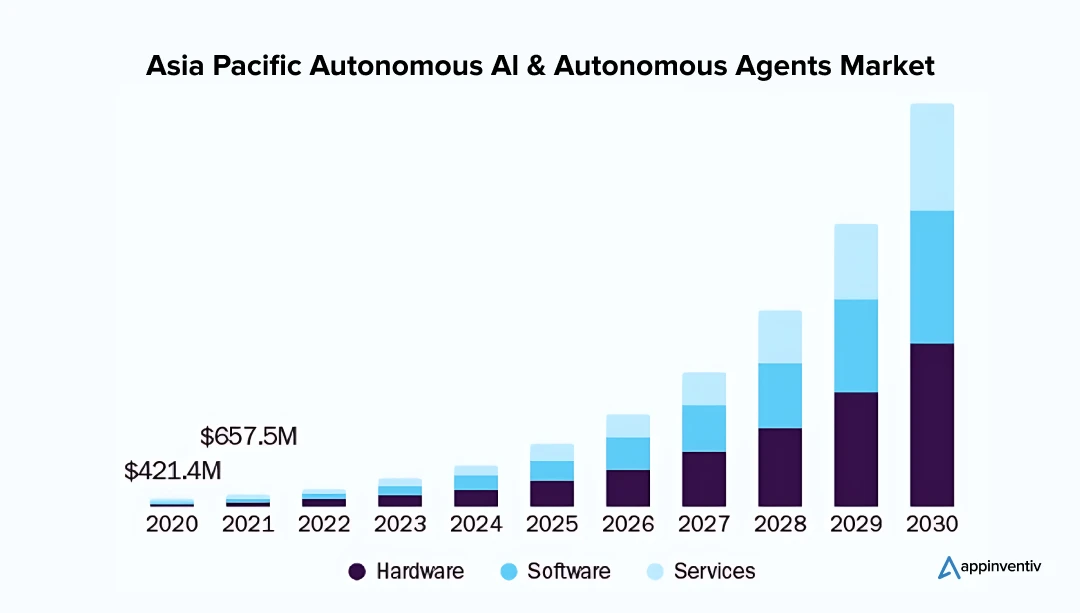
In this blog, we will delve deeper to understand how autonomous AI agents are set to transform the business world and redefine the possibilities of AI in our daily lives. From foundational principles to practical implementation techniques, let’s uncover the immense potential and transformative power of autonomous agents in business.
The Transformative Rise of Autonomous Agents in Business
Autonomous agents in business are the next big thing in the tech world that have limitless potential to drive innovation and efficiency. These “self-adaptive” or “autonomous” systems operate independently and make decisions without human intervention. At their core, they are automated AI programs designed to perform specific tasks with minimal oversight.

With the ability to learn and adapt independently, these agents serve not just as supportive hands to humans but as transformative leaders to reshape business operations. Their ability to continuously improve and address emerging challenges makes them game-changers for businesses worldwide.
You might be wondering, “How do autonomous agents in AI actually work?” Let’s understand it through a diagram that shows how it works.
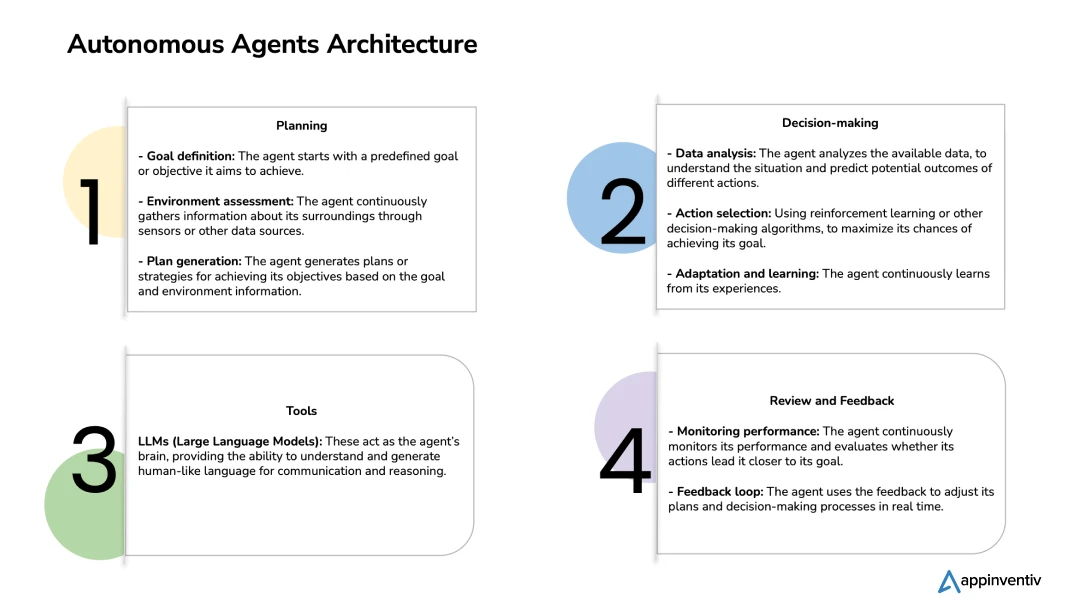
Now that we understand what autonomous agents are and how they function, let’s explore the key areas where businesses can leverage this powerful technology to automate tasks and drive growth.
Practical Applications of Autonomous Agents in Business Across Industries
Autonomous agent implementation extends beyond mere automation—they reshape entire business models with their advanced capabilities. These agents could handle tasks such as conducting research, analyzing data, coding, booking travel, managing finances, or even serving as personal assistants. The possibilities are limitless, and advancements in their capabilities are still being developed at an accelerated pace.
Here are some practical applications of autonomous agents that make a substantial impact in various sectors:
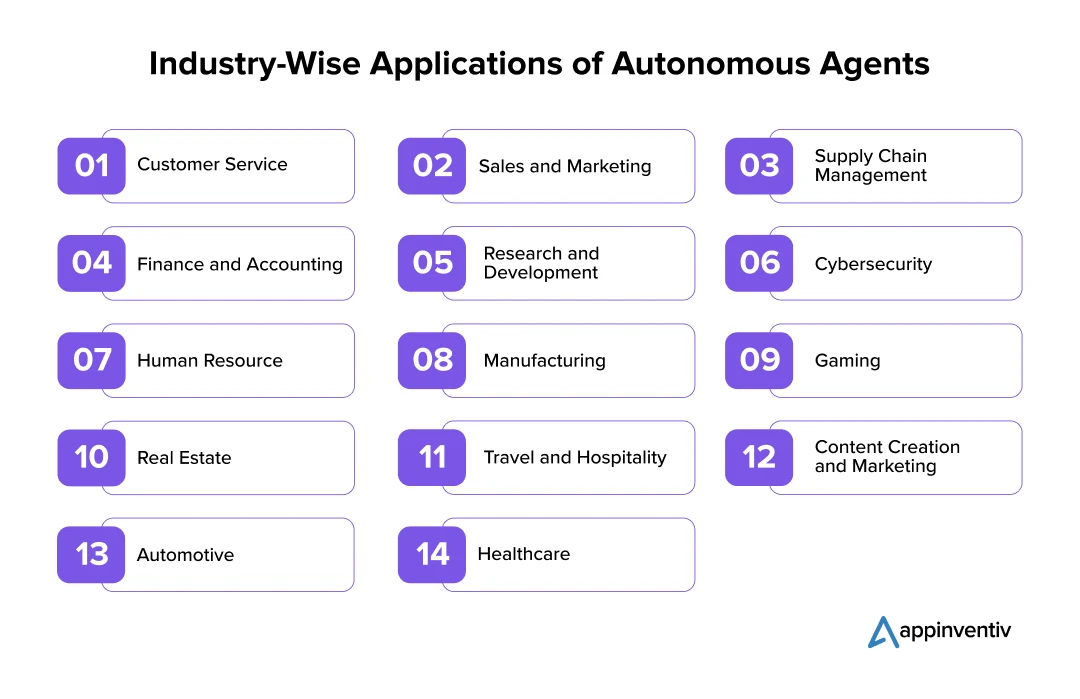
Customer Service
With 96% of customers likely to leave a business due to poor customer service, it is crucial for companies to avoid lackluster and unresponsive support. AI agents can enhance customer interactions, making them more engaging and realistic.
For instance, intelligent chatbots and virtual assistants like Apple’s Siri and Amazon’s Alexa leverage deep natural language processing (NLP) to assess customers’ sentiments, address complex queries, and provide personalized support. This technology not only improves customer interaction but also minimizes wait times and operational costs, offering a 24/7 service that adapts to customer needs with increasing precision.
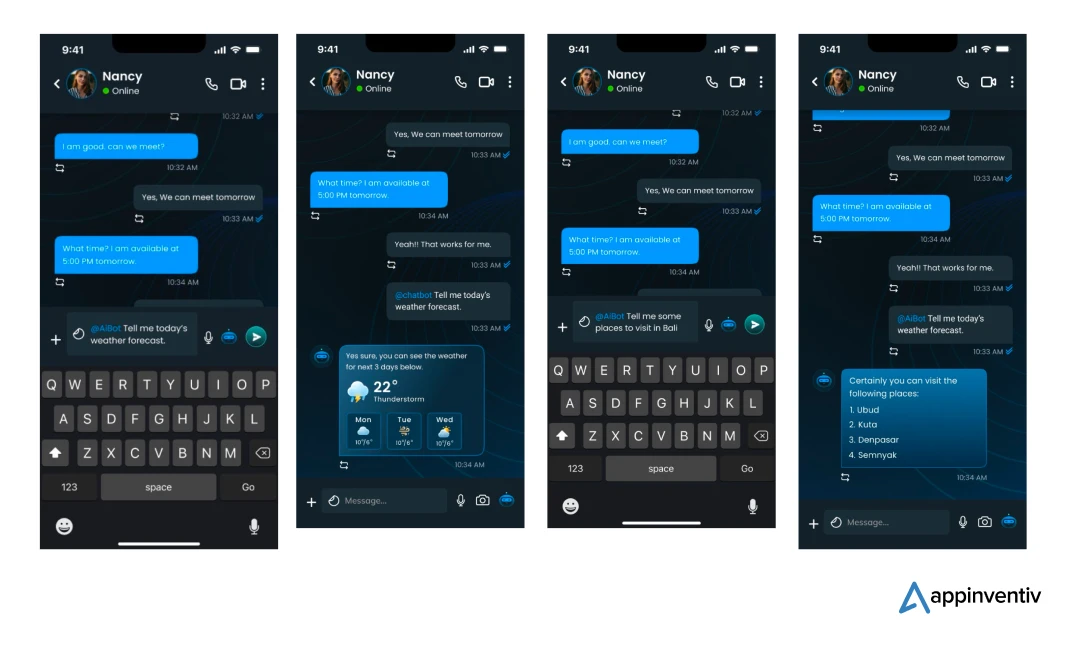
Sales and Marketing
In the realm of sales and marketing, autonomous agents drive targeted engagement and strategic optimization. They analyze vast amounts of consumer data to craft personalized marketing messages and dynamically adjust campaigns in real-time. This capability allows businesses to optimize their advertising expense and stay ahead of market trends through predictive analytics, ensuring that marketing strategies are both effective and adaptable.
This use case is highly practical in the retail and eCommerce industry, where these agents provide users with personalized shopping experiences, tailoring recommendations and services to individual customer preferences.
You may like to know: How Much Does It Cost to Build an AI-Based Shopping App Like Target?
Supply Chain Management
Supply chain management is another area where the applications of autonomous agents are making a significant impact. These agents autonomously manage inventory levels by predicting demand and automating reordering processes, reducing instances of overstocks or stockouts. What is more? Autonomous AI agents in the supply chain also optimize logistics by analyzing real-time data such as traffic patterns and weather conditions, leading to more efficient routing and cost savings.
Finance and Accounting
The future of finance and accounting lies in minimizing human intervention to achieve greater accuracy, reduced errors, and enhanced transparency. This fuels a significant demand for AI agents to reduce manual errors and administrative burdens while ensuring robust security and compliance. Autonomous AI agents in finance handle financial reconciliation, generate real-time reports, and monitor transactions to detect and prevent fraud.
Research and Development
One of the most practical applications of autonomous agents is in research and development, where these self-adaptive agents accelerate data analysis and innovation. They sift through extensive research data to identify significant patterns and generate actionable insights, dramatically reducing the time required for data interpretation and driving faster advancements in technology.
Related Article: Use Cases and Benefits of AI Analytics for Businesses
Cybersecurity
According to a report, 68% of data breaches occur due to non-malicious elements, like human error, but AI agents can significantly mitigate this risk. By minimizing human involvement in an organization’s cybersecurity landscape and automating the entire process, autonomous agents ensure constant monitoring of every IT system component and identify threats in real-time. Beyond detection, AI agents use historical cybersecurity data to formulate remedial solutions, enhancing the overall security landscape and reducing the likelihood of data breaches.
Human Resource
Human resources departments benefit from autonomous agents through streamlined recruitment and enhanced employee engagement. These agents automate resume screening, conduct preliminary interviews, and analyze employee performance data, expediting the hiring process and providing actionable insights to improve workplace satisfaction and productivity.
Related Article: AI in HR: Transforming the Future of Work
Real Estate
In real estate, autonomous agents assist in property management by automating tenant communication, scheduling maintenance, predicting property valuation, and managing rental payments. They also analyze market trends, identify potential buyers or renters, negotiate offers, and streamline the transaction process, freeing up human agents for more complex tasks.
For instance, HouseEazy uses AI agents to offer precise property valuations and market insights.
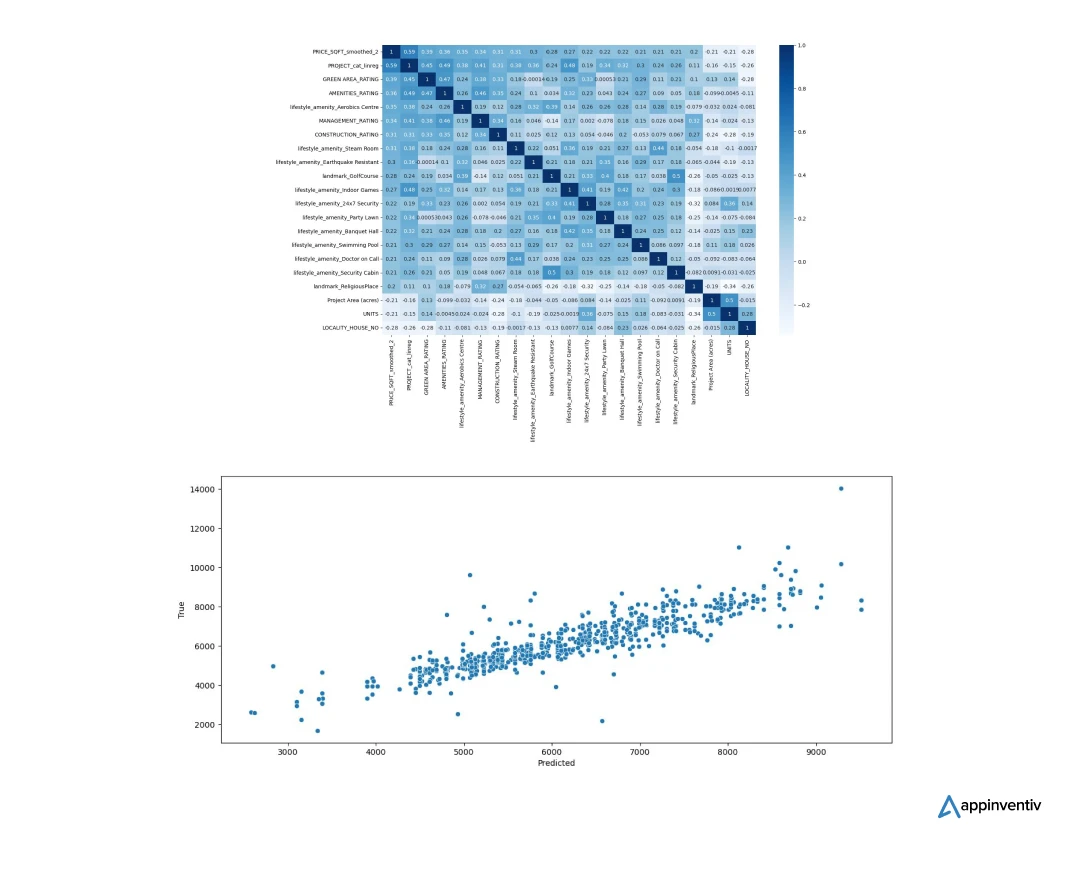
Manufacturing
In manufacturing, autonomous agents optimize production lines by predicting equipment maintenance needs, reducing downtime, and managing robot fleets more effectively. They analyze data from various sensors to ensure quality control, optimize production, and improve efficiency, leading to cost savings and increased productivity.
Gaming
The gaming industry leverages AI autonomous agents to make computer characters act more like real people, creating more dynamic and engaging player experiences. These agents can generate intelligent non-player characters (NPCs) that adapt to player behavior, provide personalized in-game assistance, and even manage multiplayer game environments to ensure fair play and balance.
Travel and Hospitality
The travel and tourism sector benefits from autonomous agents acting as personal travel assistants. Autonomous AI systems in travel can book flights and hotels, research activities, utilize loyalty points, and plan transportation. If issues arise, they can even rebook seamlessly, acting as sophisticated concierges that tailor travel experiences to individual preferences and budgets.

Content Creation and Marketing
Content marketing is a key aspect of brand promotion, and approximately 80% of organizations leverage it to create awareness and connect with customer outreach. However, creating high-quality content and drafting successful marketing strategies can be tiresome. AI agents can alleviate this burden by automating the content creation and marketing process, thereby boosting creativity and ensuring the delivery of relevant and engaging material.
Moreover, these AI agents provide businesses with the tools to monitor campaign performance and analyze the results, determining the significant ROI for each initiative. This ability to optimize and refine content marketing efforts not only saves time and resources but also enhances the effectiveness of marketing strategies, making the entire process more streamlined and cost-efficient.
Automotive
Imagine a scenario where your car drives itself and zooms around on the road safely. Autonomous agents are making this a reality with self-driving vehicles that navigate roads, avoid obstacles, and ensure passenger safety by processing real-time data from sensors and cameras. These intelligent systems optimize route planning and fleet management, reducing fuel consumption and delivery times, and can also manage public transportation schedules, improving efficiency and reliability. Autonomous vehicles are set to make commuting smoother, faster, and safer, transforming urban mobility.
For instance, automobile leaders such as Tesla and Waymo use autonomous AI in their vehicles to navigate roads, avoid obstacles, and make driving decisions without human intervention.
Also Read: AI in Transportation: Benefits, Use Cases, and Examples
Healthcare
Autonomous AI agents in healthcare contribute to both patient care and operational efficiency. They monitor patient health metrics to detect and address potential issues before they escalate, enabling proactive and personalized treatment. Additionally, they streamline administrative tasks, such as appointment scheduling and billing, allowing healthcare providers to focus more on the task they are meant to handle — Patient Care.
For instance, we developed YouComm, a healthcare communication app that leverages AI to enhance patient-nurse communication, ensure timely assistance, and improve patient care. The app’s smart AI features have significantly reduced response times and increased patient satisfaction in hospitals and care facilities.
Autonomous Agents Implementation Process
Implementing autonomous AI agents in businesses requires a strategic approach to ensure that the technology integrates seamlessly with existing systems and meets organizational goals. Here are the proven autonomous agent implementation techniques and steps to successfully deploy this self-adaptive agent in the business process.
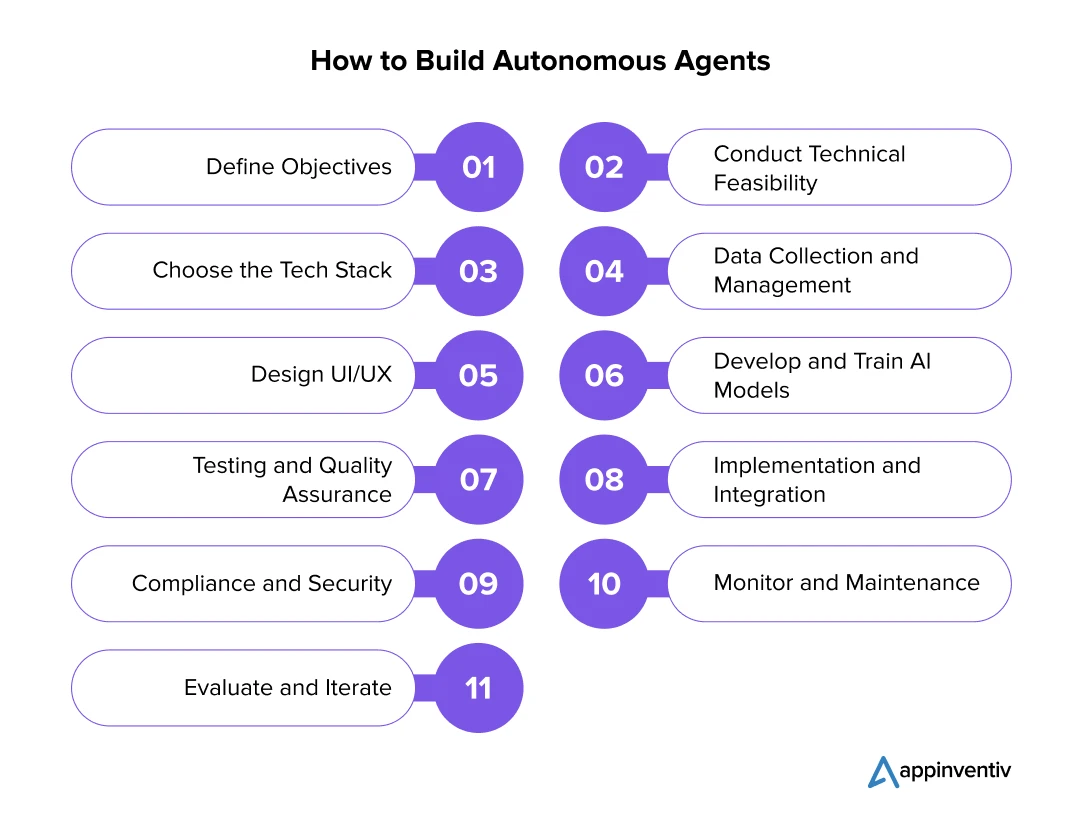
Define Objectives
Start by identifying needs or determining the specific tasks or processes where autonomous agents can add the most value, such as customer service, data analysis, or process automation.
Conduct Technical Feasibility
Before diving into AI development, you must assess the technical landscape. Autonomous AI relies heavily on high-quality data to function effectively. Thus, you need to gather and organize relevant data from diverse sources to train and refine your AI agents. Ensure the data is accurate, complete, and free of biases to improve the performance of AI models. Additionally, you must examine integration capabilities with existing systems to ensure seamless operation. This step is crucial to determine whether the project can meet its objectives within the given technical constraints.
Also Read: Responsible AI – Addressing Adoption Challenges With Guiding Principles and Strategies
Design the Agent Architecture
Develop a visually appealing and robust architecture that is intuitive and easy to navigate, ensuring that the autonomous agents are scalable, accessible, and high-performing. Focus on crafting a well-designed architecture that ensures efficient data and interaction processing. By creating the agent architecture, you can make the technology more effective and easier to integrate into your daily business operations.
Choose the Right Tech Stack
Evaluate and choose the right tech stack and AI technologies that best fit your needs, whether it is machine learning (ML) models, NLP systems, computer vision techniques or robotic process automation (RPA) tools. Ensure that the chosen technology can integrate with your existing IT infrastructure and software systems.
Develop and Train AI Agents
The next vital step is to develop custom AI models tailored to your specific requirements. This is the most vital step of the entire autonomous agents implementation technique, ensuring the successful execution of your idea. At this stage, developers build AI models and verify that they comply with data protection regulations and industry compliances such as GDPR. Implement security measures to protect against potential vulnerabilities and ensure the safety of the autonomous agents and the data they handle. Also, they train the AI agents to update their knowledge and improve performance based on new data and feedback over time.
The cost of developing AI agents depends on factors like the complexity of these models, the resources required for compliance and security, and the extent of training needed to achieve optimal performance.
Also Read: Why and how to develop legally compliant AI products
Testing and Quality Assurance
Before you deploy the final product to the intended infrastructure, it is time to test them against various scenarios to address any issues and refine their performance. This thorough testing phase ensures that the autonomous agents function as expected under different conditions and meet the required standards of quality and reliability.
Deployment
Deploy the autonomous agents into your business processes, such as CRM, ERP, etc., ensuring they are properly configured, able to access relevant data, and can provide impressive outcomes.
Monitor and Maintenance
Review and update the performance of autonomous agents regularly and incorporate new features into the system to ensure it can efficiently adapt to changing business needs. This ongoing maintenance will help you fix bugs, resolve glitches, and adapt to changing customer needs.
Evaluate and Iterate
Developing an AI agent is a one-time process, but ensuring its uninterrupted performance is an ongoing journey. Thus, you must continuously gather insights from user feedback, track how the AI is being used, and analyze key performance indicators to refine the AI model performance and align it with evolving user needs.
The Future of Implementing Autonomous Agents in AI
Autonomous agents are on the verge of profoundly transforming the entire business landscape in every industry. These agents provide versatile, intelligent assistance, enabling the execution of complex tasks with greater accuracy and efficiency. Enhanced by continuous learning, autonomous agents in AI not only automate routine processes but also handle decision-making and strategic planning, driving significant productivity and innovation. As technology advances, these agents will move towards a nearly human-less enterprise, where robots and digital agents form the primary workforce.
However, it is just the beginning of the autonomous agents revolution. The future of these digital helpers is more promising than we can imagine. Of course, human intervention or supervision will still play an integral role, but enterprises need to leverage the powerful ecosystems of autonomous agents to stay competitive in the new AI-driven era. Companies that fail to embrace these groundbreaking technologies will fall behind their rivals.

Moreover, the synergy between autonomous agents and emerging technologies like IoT, blockchain, and 5G will unlock new potentials, such as managing energy consumption and traffic flows in smart cities and enhancing real-time processing through edge computing.
The integration of human and AI agents is not just a glimpse of the future—it is present, and it is a journey worth embarking on. In fact, implementing autonomous agents in business has no longer been a choice; it is a dire necessity for a technologically enriched and progressive future.
Develop and Deploy Autonomous Agents in Business with Appinventiv
We are in an age where AI agents are taking on roles we used to think only humans could do. With the rapid advancements in artificial intelligence, AI-generated outcomes in business management are reaching impressive levels of quality. Autonomous AI agents in business have taken things to the next level by automating the entire business process across industries.
From generating high-quality content and automating administrative workflows to scheduling predictive maintenance and addressing user queries, autonomous agents in AI are the next universal lingua franca in the modern business world. However, as technologies continue to evolve, it will be extremely challenging to understand the underlying technology of autonomous agent development and build these systems correctly.
At Appinventiv, we possess an in-depth understanding of advanced AI technologies like ML, NLP, and RAG, which lead to the accelerated development of cutting-edge autonomous AI agents. Our team of 1600+ tech nerds knows how to strike the right balance between adhering to best practices in digital platform development and leveraging the maximum potential of artificial intelligence technology.
Still unsure about our capabilities in delivering AI development services that drive unparalleled outcomes and can elevate your business to greater heights? Well, seek insight from our AI-driven projects like Tootle, JobGet, Chat & More, HouseEazy, and Vyrb, which have driven tangible outcomes in their respective fields and testify to our supremacy in delivering state-of-the-art solutions.
For instance, we integrated AI assistants like Siri and Google Assistant in Vyrb (a social media app) to create a unique voice-based social networking experience. The app uses advanced speech recognition and NLP to enable users to interact with their networks through voice commands, offering a hands-free and engaging user experience that sets it apart in the crowded social media landscape.
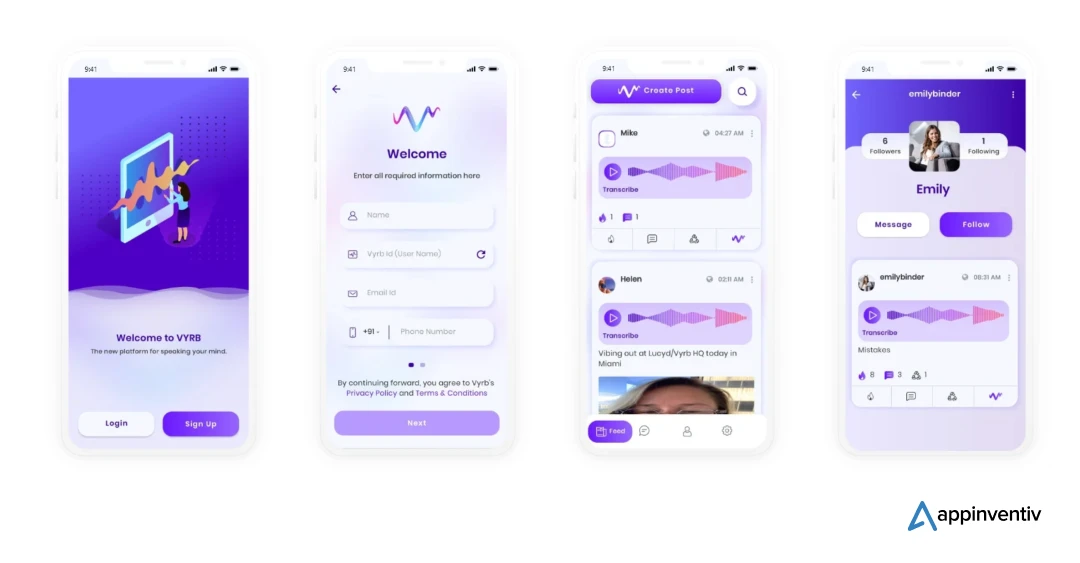
Like Vyrb, 77% of other organizations are either already using or planning to leverage AI in their businesses. Now, it is your time; don’t miss out on the digital revolution of autonomous agents. Get in touch with our AI experts and learn how autonomous agents in business can automate all your workflow in a twinkling eye.
FAQs
Q. What are autonomous agents?
A. Autonomous agents are AI-driven systems capable of performing a multitude of tasks efficiently and independently without human intervention. These digital agents utilize ML, NLP, and other AI technologies to make decisions, learn from experiences, and adapt to new situations. They perform complex tasks more effectively and deliver relevant outcomes.
Q. How do autonomous agents help businesses?
A. Autonomous agents enhance business efficiency by automating routine tasks, improving decision-making, and optimizing processes. They reduce operational costs, increase productivity, and enable real-time data analysis, driving innovation in various industries. For instance:
- In healthcare, they could provide personalized patient care and predictive diagnostics.
- The transportation industry will benefit from fully autonomous vehicles and optimized logistics, leading to safer and more efficient travel.
- In banking and finance, these digital drivers offer advanced risk management and investment strategies.
- In retail and eCommerce, autonomous AI agents provide instant support and personalized shopping experiences.
Q. What are some real-world examples of autonomous agents in AI?
A. Here are some real-world examples of autonomous agents in AI that are transforming industries with their diverse applications and capabilities:
- AutoGPT
- LangChain
- Fetch.AI
- BabyAGI
- Camel
Q. What are the types of autonomous agents?
A. Autonomous agents in business can be classified into six prime categories, depending on their operational capabilities, degree of autonomy, and the complexity of tasks they perform. Here are some known types of autonomous AI agents in businesses:
- Reactive autonomous agents
- Model-based autonomous agents
- Deliberative autonomous agents
- Goal-based autonomous agents
- Hybrid autonomous agents
- Utility-Based autonomous agents


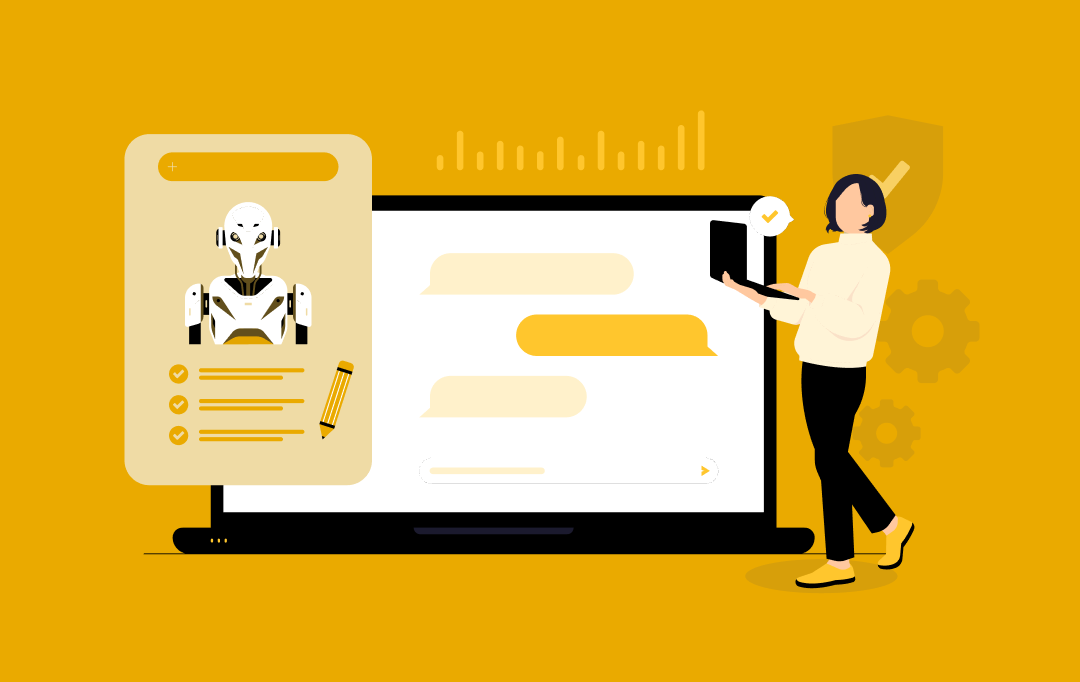
AI Agent-Driven UIs: Replacing App Menus and Buttons
Key takeaways: Challenge: Static menus and buttons also become outdated because people are frustrated by limited, multi-stage navigation. Solution: The AI Agent interacts with the user through a friendly UI that does not require cludgy menus but conversational and context-sensitive navigation. The Way AI Agents Work: AI agents establish a basis of natural language understanding,…
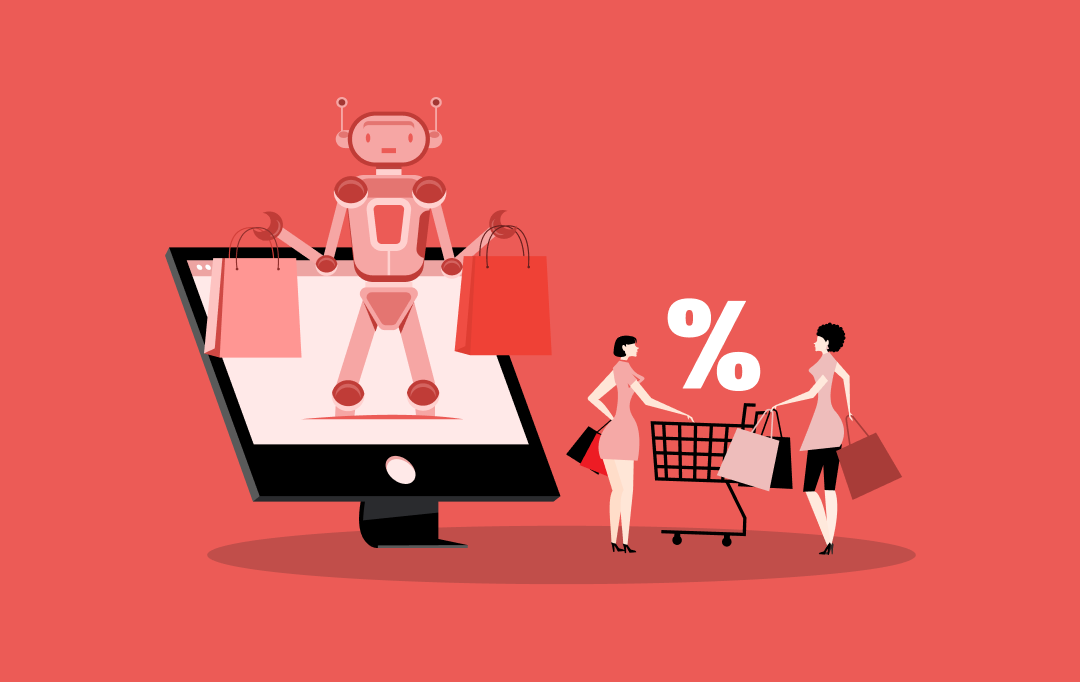
10 Use Cases and Benefits of How AI Agents Are Revolutionizing the Retail Industry
Key takeaways: AI agents in the retail industry are revolutionizing businesses by enhancing customer experience and streamlining operations. From personalized recommendations to predictive analytics, AI offers tangible benefits like increased conversions and reduced costs. AI adoption can lead to scalable growth and a competitive edge in the retail industry. Retailers must consider data strategies, talent…
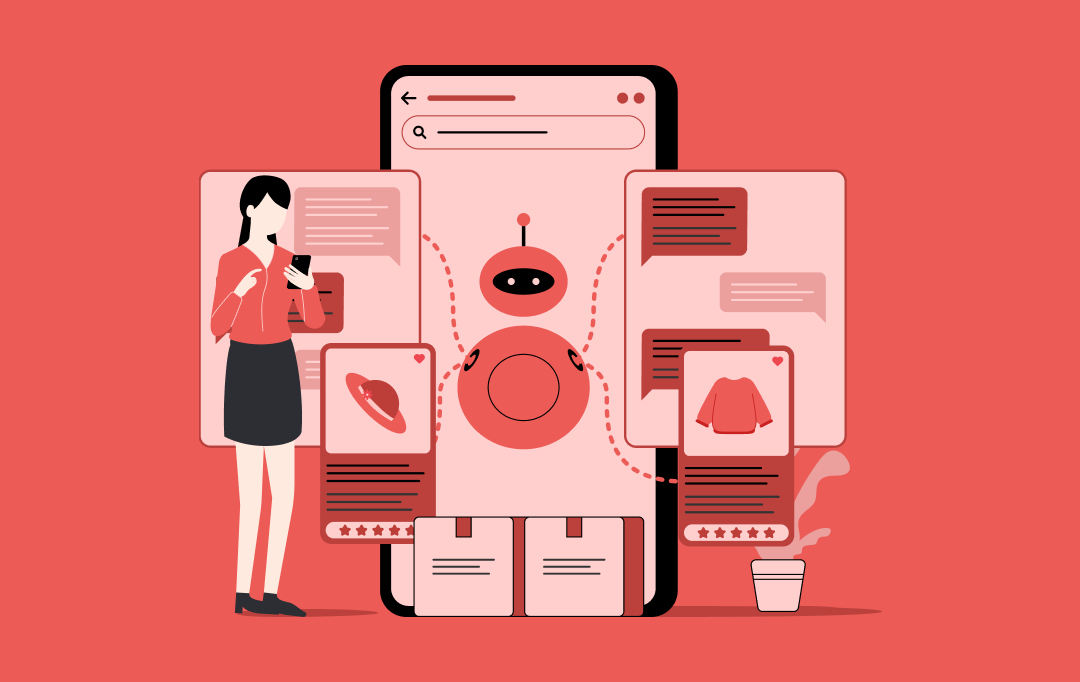
12 Ways AI is Revolutionizing the Fashion Industry
Key takeaways: AI in fashion is booming, with a market value of $28.48 billion by 2032 and a 39.43% CAGR. It's transforming design, trends, shopping, manufacturing, and customer service. Top brands like Zara and H&M report 200% higher conversions, 64% fewer returns, and 25% better retention. Success demands strategy, data infrastructure, and phased AI integration…






